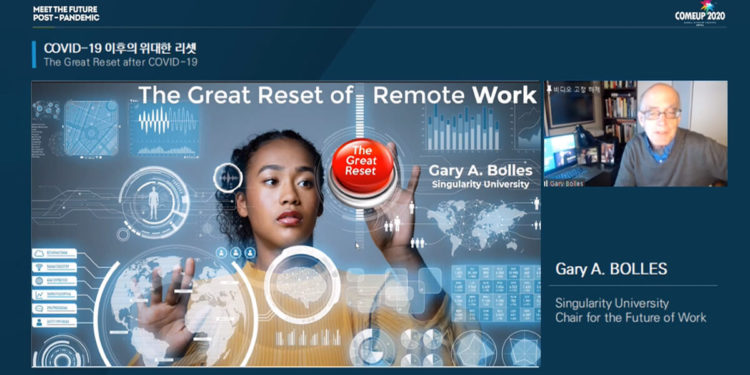The Ministry of SMEs and Startups launched this year’s biggest startup festival in South Korea, the COMEUP 2020, from November 19-21. The three-day event aims to connect startups and business ventures under the theme “Meet the Future – Post Pandemic.”
The second day took on quantum computing, open innovation, robotics, artificial intelligence, remote work, and the future of manufacturing.
Remote Work: The Great Reset after COVID-19
In his talks, Gary Bolles, Chair for the Future of Work of Singularity, focused on what he calls “The Great Reset,” on the work environment post-COVID-19 pandemic. Even today, various industries witnessed the shift of how people do jobs, meetings, and conferences to “remote work.”

Gary Bolles is a lecturer, writer, and consultant on the future of work, learning, and organization. He focuses on helping individuals, organizations, communities, and countries to flourish in digital transformation.
The COVID-19 pandemic created opportunities to reset how people worked and conducted their routines. Bolles discussed how firms, startups, and institutions could reset the definition of work, teams, workplaces, and organizations.
Even before the pandemic, jobs were already becoming unbundled with various platforms’ emergence to accomplish work. Team collaborations could be performed with Slack, Asana, Basecamp, and Wurkr; portfolios could be made with eParachute, Lessonly, and Udacity; skills could be applied through platforms such as Upwork, Toptal, and TaskRabbit; co-working facilities through WeWork, and Impact Hub; and compensation through Venmo, CrossPay, and Maha.
These platforms create a new norm of distributed talent, which companies, startups, and institutions could leverage and benefit. Bolles said that to innovate continuously, organizations should seek new approaches to utilize suddenly distributed talents globally.
Panel Discussion: The New Era of Remote Work: Strategies for the Distributed Enterprise
Along with experts, Gary Bolles held a remote video conference to discuss strategies for the new era of distributed enterprise. The panelists included principal at international firm Woods Bagot Amanda Stanaway, founder and CEO of VR company Kololux, Christian Glessner, and CEO of messaging platform Sendbird, John Kim. The panel discussion covered topics on how the work system changed during the pandemic and how it could affect the workforce post-pandemic.

Amanda Stanaway talked about improving the workspace and creating a “smart space” to deal with the changing work environment. For instance, in South Korea, office spaces became hotspots for coronavirus outbreaks, prompting future offices’ design to significantly consider health and safety. She added that what people missed during the lockdowns is the social interaction and human part of work, so designing spaces to ensure longevity would be the norm.
Meanwhile, Christian Glessner discussed how leaders and workers could integrate virtual reality (VR) to create new and safer workplaces. VR could allow users to bridge communication gaps, such as presentations in designs and spaces. John Kim presented examples of firms adapting to remote work by utilizing a common online platform.
Panel Discussion: Future of Work: Collaborating with AI
The next panel discussion on remote work focused on how artificial intelligence could shape the future of workspaces and jobs. The executive director of Korea Startup Forum, Sung Jin Choi, moderated the talk on emerging technologies based on AI.

The panelists included Channy Yun, Principal Tech Evangelist at Amazon Web Services (AWS), Jun Seung Lee, CEO of Shopl & Company, and Bo Hwang, Vice President of Saltlux.
The pandemic forced people to work from home, creating an accelerated learning curve to apply AI in various administrative activities. Companies also saw the opportunity to develop various automation technologies to go along with remote work. The experts concluded the panel discussion by saying that people should learn to live and work with AI technology in the post-pandemic era.







